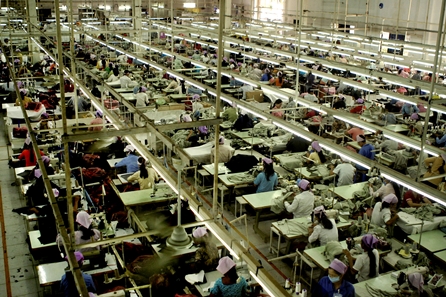Corinna Braun-Munzinger, PhD researcher at the Global Development Institute
Does it make you feel good to know that all coffee sold at the university cafeteria is fair trade certified? Did you feel less comfortable about buying that £3 T-shirt when you saw the media reports about 1100 workers dying in the Rana Plaza factory collapse in Bangladesh a few years back? And have you ever stood in the supermarket wondering if it is worth paying double the price for organic tomatoes? If your answer is yes to any of these questions, then you seem to be what Tim Bartley and his co-authors call a ‘conscientious consumer’.
 During a Masterclass organised jointly by the Global Production Networks, Trade and Labour research group and the Rory and Elizabeth Brooks Doctoral College, we (a bunch of PhD students and academics passionate about finding out how to address sustainability in global production) had the chance to discuss with Tim his new book “Looking behind the Label”. In the book, the authors describe that sustainability labels such as fair trade or organic have seen a boom in the US and in European countries over the past years. They show how conscientious consumption relates to some individuals’ postmaterialist values, as well as to a number of wider societal factors, such as the structure of the retail sector – for example, it is easier to buy fair trade chocolate if your regular supermarket stocks it than if you have to go to a special ‘one-world shop’ to get it.
During a Masterclass organised jointly by the Global Production Networks, Trade and Labour research group and the Rory and Elizabeth Brooks Doctoral College, we (a bunch of PhD students and academics passionate about finding out how to address sustainability in global production) had the chance to discuss with Tim his new book “Looking behind the Label”. In the book, the authors describe that sustainability labels such as fair trade or organic have seen a boom in the US and in European countries over the past years. They show how conscientious consumption relates to some individuals’ postmaterialist values, as well as to a number of wider societal factors, such as the structure of the retail sector – for example, it is easier to buy fair trade chocolate if your regular supermarket stocks it than if you have to go to a special ‘one-world shop’ to get it.
Tim Bartley and colleagues also go on to question whether conscientious consumerism is a good thing to improve social and environmental sustainability of production. On the one hand, it may show that people are more aware and put pressure on brands and retailers to improve sustainability – but on the other hand, conscientious consumerism could actually be counterproductive if it distracts from other options of political engagement or obscures governments’ responsibility for some of these issues. So there are two ways of looking at the rise of conscientious consumption.
The great thing about the book is that it does not stop there, but brings together the discussion on conscientious consumers with an analysis of the effectiveness of sustainability standards and labels used to certify the products that conscientious consumers buy. For example, does it actually make a difference for conserving the rainforest if you buy a roll of toilet paper with the Forest Stewardship Council label printed on it? To answer that question, the authors draw on case studies in food, paper, garments, and electronics. They show how sustainability standards and their effectiveness are strongly influenced by the specific characteristics of sectors and products, but also by the agendas of different actors involved in shaping these standards. Overall, their conclusion is a weak defence of conscientious consumerism: Conscientious consumption can make a difference sometimes and under some conditions. But it is certainly no panacea, and additional ways need to be found to address persisting unsustainable models of production in the global economy.
Many of us researchers in the Global Production Networks, Trade and Labour research group work on issues closely related to Tim’s book. Many of us have first-hand experience of trying to make sense of sustainability standards in food, garments or electronics in our PhD research and beyond. Coming together with Tim in a small masterclass setting was a great opportunity for each of us to raise burning questions, get feedback and discuss in an informal setting with a leading expert in the field.
Going beyond the book, participants in the masterclass seemed particularly interested in exploring the roles of Southern consumers and emerging Southern sustainability standards, as well as the interactions between private standards and domestic governance on working conditions global production. Conveniently, Tim is currently working on another book on transnational governance that digs deeper into several of these aspects… expect more in 2017. We were fortunate enough to get an outlook on this project – and another opportunity to ask questions – in Tim’s afternoon lecture at GDI. In case you missed it, listen to the podcast below.
